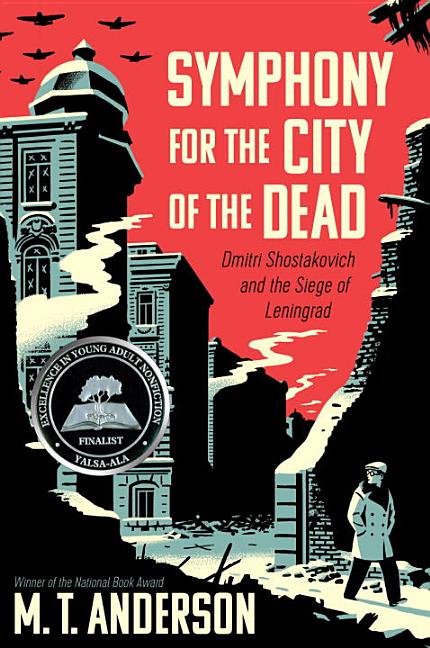Book Descriptions
for Symphony for the City of the Dead by M.T. Anderson
From Cooperative Children's Book Center (CCBC)
A substantial, complex, and compelling history provides an overview of Russia and the Soviet Union in the first fifty years of the 20th century through the life of composer Dmitri Shostakovich. Born in tsarist Russia in 1906, he was a boy who felt fervor during the revolution, and a young composer when Stalinism took hold. His early career was heavily influenced by the Soviet sense of futurism in the 1920s and then impeded as the Soviets under Stalin had stronger and stronger ideas about what was and was not art against the state. Then Germany invaded during World War II—an invasion that Stalin refused to believe was possible—and the country became united in resistance. The heart of the book is the writing and eventual impact of Shostakovich’s Seventh Symphony (The Leningrad Symphony, dedicated to the people of his home city living under German siege), which was of interest to the Allies as well as Soviets as a morale builder and propaganda tool. In telling that story, M. T. Anderson gives a deep sense of the horror and terror under both Stalinism and the Nazis while observing how difficult it is to understand some of the small truths and details about Shostakovich because so much of what he said, or others said about him, was calculated for safety during terrifying times of oppression. Visual material includes occasional black-and-white photographs and reproductions of propaganda and other material in meticulously researched volume that is exceptional in both writing and design. (Age 14 and older)
CCBC Choices 2016. © Cooperative Children's Book Center, Univ. of Wisconsin - Madison, 2016. Used with permission.
From the Publisher
A 2016 YALSA Award for Excellence in Nonfiction for Young Adults Finalist
National Book Award winner M. T. Anderson delivers a brilliant and riveting account of the Siege of Leningrad and the role played by Russian composer Shostakovich and his Leningrad Symphony.
In September 1941, Adolf Hitler’s Wehrmacht surrounded Leningrad in what was to become one of the longest and most destructive sieges in Western history—almost three years of bombardment and starvation that culminated in the harsh winter of 1943–1944. More than a million citizens perished. Survivors recall corpses littering the frozen streets, their relatives having neither the means nor the strength to bury them. Residents burned books, furniture, and floorboards to keep warm; they ate family pets and—eventually—one another to stay alive. Trapped between the Nazi invading force and the Soviet government itself was composer Dmitri Shostakovich, who would write a symphony that roused, rallied, eulogized, and commemorated his fellow citizens—the Leningrad Symphony, which came to occupy a surprising place of prominence in the eventual Allied victory.
This is the true story of a city under siege: the triumph of bravery and defiance in the face of terrifying odds. It is also a look at the power—and layered meaning—of music in beleaguered lives. Symphony for the City of the Dead is a masterwork thrillingly told and impeccably researched by National Book Award–winning author M. T. Anderson.
National Book Award winner M. T. Anderson delivers a brilliant and riveting account of the Siege of Leningrad and the role played by Russian composer Shostakovich and his Leningrad Symphony.
In September 1941, Adolf Hitler’s Wehrmacht surrounded Leningrad in what was to become one of the longest and most destructive sieges in Western history—almost three years of bombardment and starvation that culminated in the harsh winter of 1943–1944. More than a million citizens perished. Survivors recall corpses littering the frozen streets, their relatives having neither the means nor the strength to bury them. Residents burned books, furniture, and floorboards to keep warm; they ate family pets and—eventually—one another to stay alive. Trapped between the Nazi invading force and the Soviet government itself was composer Dmitri Shostakovich, who would write a symphony that roused, rallied, eulogized, and commemorated his fellow citizens—the Leningrad Symphony, which came to occupy a surprising place of prominence in the eventual Allied victory.
This is the true story of a city under siege: the triumph of bravery and defiance in the face of terrifying odds. It is also a look at the power—and layered meaning—of music in beleaguered lives. Symphony for the City of the Dead is a masterwork thrillingly told and impeccably researched by National Book Award–winning author M. T. Anderson.
Publisher description retrieved from Google Books.


